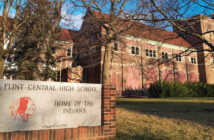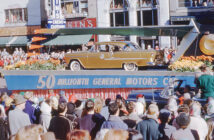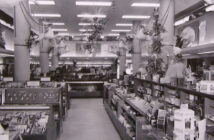The time period between 1901 and 1912 was characterized by an explosion of population and industry in Flint – the fastest growing city in the nation. Buggy, road cart and car production dominated business. In 1908, Billy Durant and friends started the General Motors Corporation and propelled the city’s economy into the stratosphere. Flint was overrun with migrant workers from all over the United States, each arriving with the hope of gaining and maintaining steady employment. In 1905, the Golden Jubilee Celebration marked the city’s 50th anniversary which brought out every major player in the city including mayors – past, present and future.
This series of profiles chronicles Flint’s mayors throughout history, providing short accounts of their professions, lives and decisions made in office (if known). Some were men/women of great deeds or of great controversy; some were simply placeholders in time. Each of them, however, chaired a city important to its country and its citizens on its path through triumph and troubles, and toward future revitalization. For Part 1, see the 2022 January issue of MCM!
Clark B. Dibble
1901-02
Born in Fenton in 1860, Clark B. Dibble was the grandson of one of the county’s first pioneer settlers, Clark Dibble, who dubbed Fenton “Dibbleville” before the arrival of Colonel William M. Fenton and Robert Leroy. His father, Thomas Jefferson Dibble, moved the family to the Oxford area when Clark B. was very young. In 1888, Dibble came back north and settled in Flint. He took a job working in the meat market of Wicks & Pierce. Two years later, he followed in the footsteps of his uncle Joel who founded a hotel in Fenton and, after the retirement of his father, began operating Dibble House – a hotel located one block from Stone’s Opera House. The hotel charged $1 a night and catered to traveling farmers. Dibble used its proximity to the Opera House as a way to entice out-of-towners. He operated the Dibble House successfully for another 17 years. In 1905, after his mayoral term, Dibble served on the reception committee for Flint’s Golden Jubilee Celebration. He died in 1932 and was buried in Avondale Cemetery. During his time as mayor, the automobile industry began when A.B.C. Hardy established the Flint Auto Company.
Austin D. Alvord
1902-04
Austin D. Alvord was born in 1843 in the State of New Jersey. He came to Flint as an older gentleman and set up his grocery business along Saginaw St. just north of downtown near today’s Rally’s restaurant. (During Alvord’s day, the more bustling business district in Flint was located north of the river.) It was during the second of Alvord’s two mayoral terms that David Dunbar Buick moved his business to Flint and began operation. After his second term, Alvord took a large role in the planning of Flint’s Golden Jubilee Celebration serving on multiple committees including the general (planning) and reception committees. In 1910, he vied for a third term of mayorship but lost to incumbent mayor Guy W. Selby. Alvord died in 1924 and was buried in Gracelawn Cemetery.
Bruce J. McDonald
1904-05
Born in 1866 in Lakeport, MI McDonald moved to Flint at age 13 to attend Flint High School. After graduation, he began employment at the First Union Bank and was soon promoted to cashier. He held that position until 1917 when he resigned, then worked as treasurer of the Home Builders and the firm of Stone, MacDonald and Kaufman. McDonald was invited to serve on the committee to form the State of Michigan’s first tax organization called by the Detroit Board of Commerce and Governor Chase S. Osborn. He and the committee voted to establish a state tax commission and to hold an annual tax conference. McDonald and his fellow initial committee members were the first members of the State Tax Commission and each had a hand in setting state taxes and procedures. (A brief report on “General Taxation” was given to the commission before their decision by future Flint Mayor, D. D. Aitken.) Upon returning to Flint from Detroit, McDonald served on the board of the First National Bank of Flint and Genesee County Savings Bank. He was struck ill in 1921 and succumbed in 1923. Bruce J. McDonald was buried in Glenwood Cemetery. While mayor, he appointed noted historian Edwin Orrin Wood a member of the police commissioners, and helped to rebuild after the Flint River escaped its banks and flooded half the city in 1904.
David Demerest Aitken
1905-06
One of ten children, D. D. Aitken was born in Flint in 1853 and educated at Flint High School. (His boyhood home still stands. The Robert P. Aitken house sits at 1110 N. Linden Rd.) Aitken worked as a bookkeeper and salesman before studying law under Judge William Newton. He was admitted to the bar in 1883 and became a partner in the firm of Lee, Aitken & Wisner. That same year, he was appointed city clerk and then city attorney from 1886-90. He was then elected to the House of State Representatives for two terms from 1893-97. There, he served as chairman of the House Committee on Mines and Mining. After his mayoral term, he served as chairman of the City Finance Advisory Board. Aitken was heavily engaged in social life as a member of the FreeMasons, Mystic Shrine, Knights Templar, Ancient Arabic Order of Nobles, and the Maccabees where he also worked as their supreme counselor and attorney. For the Golden Jubilee Celebration, Aitken served on the Finance, New Flint and Federal Building Committees, and was single-handedly responsible for all electrical displays. He led the parade with Vice President Charles Fairbanks and laid the cornerstone for the new federal building. Aitken was one of the first to declare Flint “Vehicle City.” He died in 1930 and was buried in Glenwood Cemetery.
George E. McKinley
1906-08
George E. McKinley was born in 1871 to an Irish immigrant family. His father was active in building the railroad to and through the City of Flint. McKinley was educated in the Flint school system and upon graduation, took his first job as “cash boy” at the Pierce Dry Goods store. McKinley opened a cigar factory (McKinley Cigar Co.) in Flint that he operated for ten years before closing shop and moving to Evart, MI after his stint as mayor. After approximately 18 months, McKinley returned and re-opened his factory. Interestingly enough, and against the general rule of the day, McKinley was a factory owner who was very active in labor rights. He worked as an organizer for the American Federation of Labor and superintendent of the Michigan State Free Employment Bureau. He also served as State Factory Inspector in 1914. McKinley started the Flint Fraternal Order of the Eagles and was elected the organization’s first president. He was also a member of the Royal Arch Masons, Knights of Pythias, and Elks. He assisted J. Dallas Dort in his quest to establish Flint’s park system by serving as secretary of the Flint Park Board and as a member of the Park Commissioners. George E. McKinley died in 1941 and was buried in Glenwood Cemetery. While he was mayor, McKinley was one of the first to welcome the Weston-Mott Company and C. S. Mott to Flint. An advertisement for his cigar company sits in the Smithsonian Museum in the form of a baseball mitt scorecard that advertises “Mac’s Best 5-cent Cigars.”
Horace C. Spencer
1908-09
Born in 1832 in Erie County, NY Spencer journeyed to Michigan in 1866. In 1877, he invested the majority of his money as one of the original stockholders in the Second National Bank of Bay City. Next, he traveled to Flint in 1880 and opened a hardware business. It wasn’t long before Spencer entered the banking industry in Genesee County becoming the director and vice president of the Genesee County Savings Bank (GCSB), later becoming chairman of the board. While with the GCSB, Spencer was elected to the State Senate for two consecutive terms serving on the State Redistricting Committee, the Committee for Public Lands, and acting as chairman of the Committee on State Reform Schools and State Mental Institutions. In 1891, he helped establish Citizens Commercial and Savings Bank in Flint, serving as its first cashier until 1903. After his banking days, he joined Dort and McKinley on the Flint City Park Board and served on the State Board of Agriculture in charge of finance. As mayor, Spencer oversaw a year of rapid business expansion. During that time, Albert Champion moved his spark plug business to Flint; Durant started General Motors; Whiting, Whey and Paterson began their automobile factories and the Flint YMCA was opened to the city’s youth. Horace C. Spencer died in 1926.
Guy W. Selby
1909-11
Selby was born in 1871 and eventually moved to Flint looking to become a lawyer in the rapidly growing city. He was a very successful attorney in the Flint firm of Farley & Selby from 1910-28, representing a variety of city institutions including the Genesee County Savings Bank. He was a nearly constant thorn in the city’s side, continually taking up cases brought against it. He argued successfully against City Attorney Frank G. Millard on numerous occasions and in the Michigan Supreme Court. In 1916, he became the president of the Genesee County Bar Association. He held a particular grudge against Bruce J. McDonald and contested his election to the City Charter Commission in front of the Michigan Supreme Court on the grounds that McDonald did not meet the residency qualifications. Selby lost the case and McDonald was able to take his place on the commission. While in office, Selby oversaw the construction of a new city hall. Also during his mayoral term, the Flint Country Club and the Michigan Lumber Company began operation. Selby died in 1968.
John A. C. Menton
1911-12
Menton holds the distinction of being Flint’s only socialist mayor. Born in 1865 in Saginaw, he moved with his family to Flint at the age of four. At age 15, he left school and became a cigar maker’s apprentice. When he was 28, he became involved in the labor fight and was nominated president of the local cigar maker’s union and ten years later, acted as secretary and treasurer for the Central Labor Union. From 1902-05, he was secretary of the state socialist organization and represented Michigan on the Socialist National Committee. The 1911 mayoral election came as a surprise to both the city and the nation with Republican Edwin W. Atwood, Democrat William Wildanger and Menton squaring off for the seat. Menton won in what was considered a landslide making Flint only the second city in the country to elect a socialist mayor. The two major parties were shocked, but their loss could have been foreseen if not for hubris. Flint was rapidly filling with young workers from all around the country who hoped for a better life and believed that a union man in office could provide it.
In office, Menton was progressive and acted quickly. He set off a firestorm when he nominated George Artis, a black man, as police commissioner – the first mayor in the nation to do so. The city council never approved the appointment saying that “none of the aldermen … have anything against him as a man … but they do not propose to have other than a white man holding public office in Flint.” Menton defended his appointment, saying, “In my opinion, the fact that he is a colored man is no reason why he should not be recognized as a proper incumbent of any office he is capable of filling.”
The rest of Menton’s plans included improved garbage collection, milk inspection, the creation of an office of electrical inspectors, timely council meetings, park improvement, improved worker safety, better trolley systems, improved fire escapes in factories, established night schools for worker education, and an eight-hour workday and higher minimum wage. He also supported a boulevard plan leading to city ownership of the riverfront and better access to its riverside parks.
For the 1912 election, the democrats and republicans joined forces with the Flint Daily Journal to make absolutely sure Menton lost. They pegged C. S. Mott to run against him as an Independent and began their assault from the newsstand with claims that Menton and socialism would: destroy the working class, usher in a government of mob rule, destroy religious liberty, deny the existence of God and destroy patriotism. In C. S. Mott, the Journal wrote, “workers have a friend and a platform to liberty.” The populace was swayed and Mott won the election by 1,600 votes. Menton faded into obscurity. He died in 1947 and was buried in Mount Morris Cemetery.








